Related Research Articles

Universal Serial Bus (USB) is an industry standard that establishes specifications for cables and connectors and protocols for connection, communication and power supply (interfacing) between computers, peripherals and other computers. A broad variety of USB hardware exists, including eleven different connectors, of which USB-C is the most recent.

The Iyonix PC was an Acorn-clone personal computer sold by Castle Technology and Iyonix Ltd between 2002 and 2008. According to news site Slashdot, it was the first personal computer to use Intel's XScale processor. It ran RISC OS 5.

Secure Digital, officially abbreviated as SD, is a proprietary non-volatile memory card format developed by the SD Association (SDA) for use in portable devices.

OSNews is a computing online newspaper. It originally focused on operating systems and their related technologies that launched in 1997, but is now aggregating consumer electronics news. The content is managed by a group of editors and the owner. As of 2014, its managing editor is Thom Holwerda, who joined in 2005.
Arch Linux is a Linux distribution for computers with x86-64 processors. Arch Linux adheres to five principles: simplicity, modernity, pragmatism, user centrality, and versatility. In practice, this means the project attempts to have minimal distribution-specific changes, minimal breakage with updates, pragmatic over ideological design choices and focuses on user-centrality rather than user-friendliness.
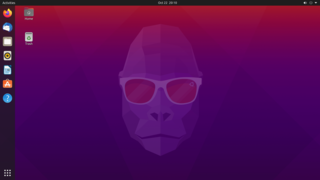
Ubuntu is a Linux distribution based on Debian and mostly composed of free and open-source software. Ubuntu is officially released in three editions: Desktop, Server, and Core for Internet of things devices and robots. All the editions can run on the computer alone, or in a virtual machine. Ubuntu is a popular operating system for cloud computing, with support for OpenStack. Ubuntu's default desktop has been GNOME, since version 17.10.

Puppy Linux is an operating system and family of light-weight Linux distributions that focus on ease of use and minimal memory footprint. The entire system can be run from random-access memory with current versions generally taking up about 600 MB (64-bit), 300 MB (32-bit), allowing the boot medium to be removed after the operating system has started. Applications such as AbiWord, Gnumeric and MPlayer are included, along with a choice of lightweight web browsers and a utility for downloading other packages. The distribution was originally developed by Barry Kauler and other members of the community, until Kauler retired in 2013. The tool Woof can build a Puppy Linux distribution from the binary packages of other Linux distributions.

The A9home was a niche small-form-factor desktop computer running RISC OS Adjust32. It was officially unveiled at the 2005 Wakefield Show, and is the second commercial ARM-based RISC OS computer to run a 32-bit version of RISC OS. When the Iyonix PC was withdrawn from sale, the A9home remained the only hardware to be manufactured specifically for the RISC OS marketplace.

The Sony Reader was a line of e-book readers manufactured by Sony, who produced the first commercial E Ink e-reader with the Sony Librie in 2004. It used an electronic paper display developed by E Ink Corporation, was viewable in direct sunlight, required no power to maintain a static image, and was usable in portrait or landscape orientation.

Zonbu is a technology company that markets a computing platform which combines a web-centric service, a small form factor PC, and an open source based software architecture. Zonbu was founded by Alain Rossmann and Gregoire Gentil.
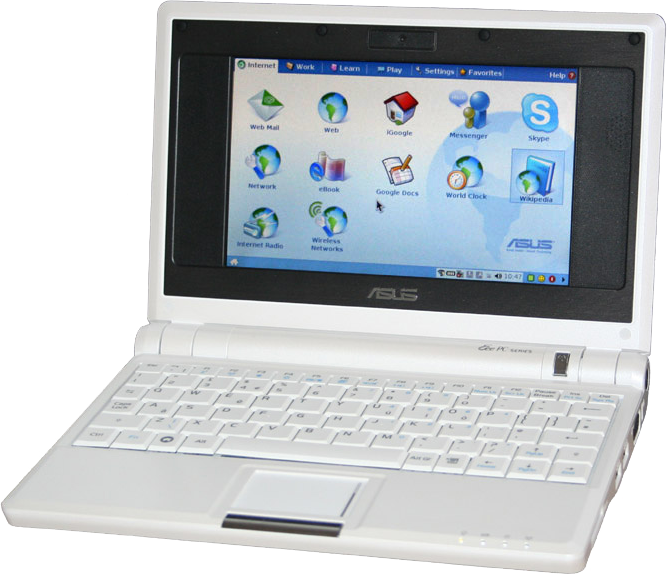
The Asus Eee PC is a netbook computer line from Asus, and a part of the Asus Eee product family. At the time of its introduction in late 2007, it was noted for its combination of a lightweight, Linux-based operating system, solid-state drive (SSD), and relatively low cost. Newer models added the options of Microsoft Windows operating system and rotating media hard disk drives (HDD), and initially retailed for up to 500 euros.

USB 3.0 is the third major version of the Universal Serial Bus (USB) standard for interfacing computers and electronic devices. Among other improvements, USB 3.0 adds the new transfer rate referred to as SuperSpeed USB (SS) that can transfer data at up to 5 Gbit/s (625 MB/s), which is about 10 times faster than the USB 2.0 standard. It is recommended that manufacturers distinguish USB 3.0 connectors from their USB 2.0 counterparts by using blue color for the Standard-A receptacles and plugs, and by the initials SS.
Nvidia Ion was a product line of Nvidia Corporation intended for motherboards of low-cost portable computers. It used graphics processing units and chipsets intended for small products.
The Dell Inspiron Mini Series is a line of subnotebook/netbook computers designed by Dell. The series was introduced in September 2008 amidst the growing popularity of low-cost netbook computers introduced by competitors.
The Nook Color is a tablet computer/e-reader that was marketed by Barnes & Noble. A 7-inch (18 cm) tablet with multitouch touchscreen input, it is the first device in the Nook line to feature a full-color screen. The device is designed for viewing of books, newspapers, magazines, and children's picture books. A limited number of the children's books available for the Nook Color include interactive animations and the option to have a professional voice actor read the story. It was announced on 26 October 2010 and shipped on 16 November 2010. Nook Color became available at the introductory price of US$249. In December 2011, with the release of the Nook Tablet, it lowered to US$169. On 12 August 2012, the price lowered to US$149. On 4 November 2012, the price was further lowered to US$139. The tablet ran on Android.
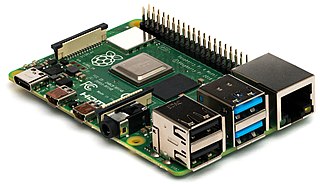
Raspberry Pi is a series of small single-board computers developed in the United Kingdom by the Raspberry Pi Foundation in association with Broadcom. Early on, the Raspberry Pi project leaned towards the promotion of teaching basic computer science in schools and in developing countries. Later, the original model became far more popular than anticipated, selling outside its target market for uses such as robotics. It is now widely used in many areas, such as for weather monitoring, because of its low cost, modularity, and open design.
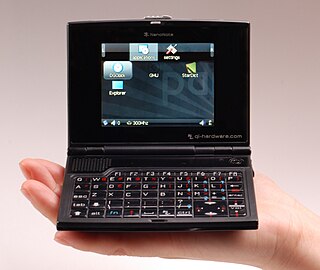
The Ben NanoNote is a pocket computer using the Linux-based OpenWrt operating system. An open-source hardware device developed by Qi Hardware, it has been called possibly "the world's smallest Linux laptop for the traditional definition of the word.". In addition, the Ben NanoNote is noteworthy for being one of the few devices on the market running entirely on copyleft hardware.
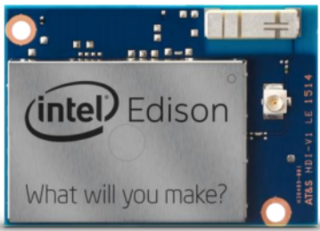
The Intel Edison is a computer-on-module that was offered by Intel as a development system for wearable devices and Internet of Things devices. The system was initially announced to be the same size and shape as an SD card and containing a dual-core Intel Quark x86 CPU at 400 MHz communicating via Bluetooth and Wi-Fi. A later announcement changed the CPU to a 500 MHz Silvermont dual-core Intel Atom CPU, and in September 2014 a second version of Edison was shown at IDF, which was bigger and thicker than a standard SD card.

The Micro Bit is an open source hardware ARM-based embedded system designed by the BBC for use in computer education in the United Kingdom. It was first announced on the launch of BBC's Make It Digital campaign on 12 March 2015 with the intent of delivering 1 million devices to pupils in the UK. The final device design and features were unveiled on 6 July 2015 whereas actual delivery of devices, after some delay, began in February 2016.
Pine64 is an organization which designs, manufactures and sells single-board computers, notebook computers and smartphones.
References
- ↑ "Humane Informatics". Humane Informatics. Retrieved December 7, 2019.
- 1 2 3 Ganapati, Priya (July 27, 2010). "$20 Wikipedia Reader Uses 8-Bit Computing Power". Wired. Retrieved December 7, 2019.
- ↑ Baichtal, John (July 18, 2010). "The Humane Reader: A $20 'computer'". Make. Retrieved December 7, 2019.
- ↑ Miller, Josh (July 10, 2019). "Humane Reader is a $20 8-bit PC for TVs". Engadget. Retrieved December 7, 2019.
- ↑ "Humane Reader is a $20 8-bit PC for TVs". OSNews. July 26, 2010. Retrieved December 7, 2019.
- ↑ "Humane Reader For Developing Countries Costs About $20" (PDF). Ethiopian Review. July 20, 2010. Retrieved December 7, 2019.
- ↑ Hernandez, Miguel (July 16, 2010). "An Open Source 8-Bit Computer to Save the World". Linux Journal. Retrieved December 7, 2019.
- ↑ "The Humane Personal Computer". Humane Informatics. Retrieved December 7, 2019.